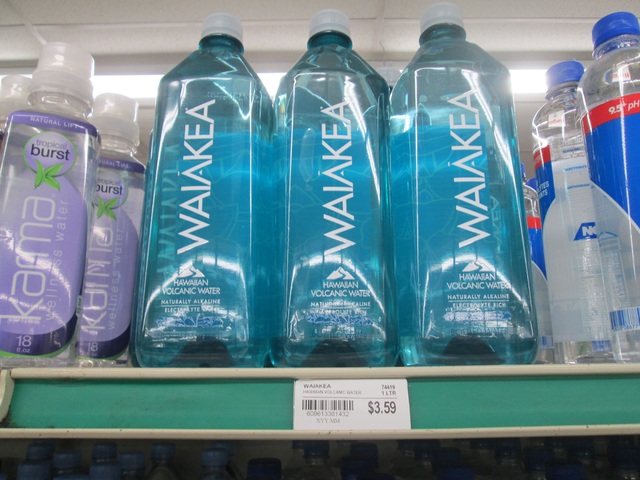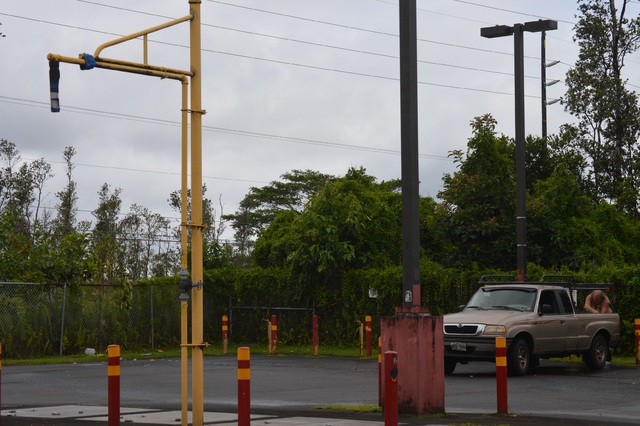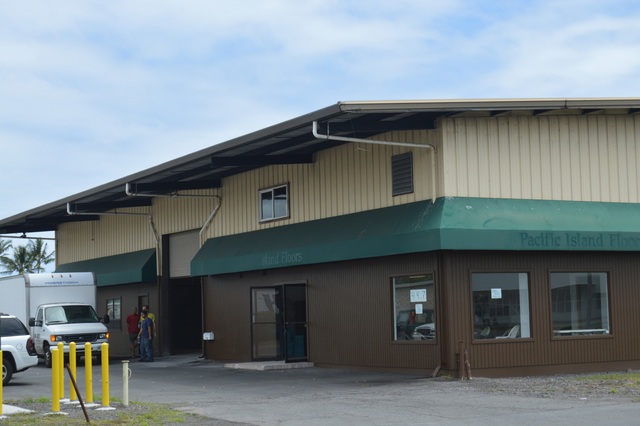Tapped out: County water is source of premium brand
The California Department of Public Health is investigating a complaint about Waiakea Hawaiian Volcanic Water involving “issues such as labeling and source water requirements associated with Waiakea.”
ADVERTISING
Waiakea is a premium Hawaii water brand bottled in southern California. It is marketed mostly on the mainland, although it is sold in Hawaii in limited quantities in stores including Island Naturals and Whole Foods.
The company’s slogan is “drink healthy, drink sustainably, drink ethically.”
On its website, the company touts its water “originates in Hawaii through both snowmelt and rain on the pristine snowcapped peak of the active Mauna Loa volcano … then filtered through 14,000 feet of porous lava rock before re-emerging at its source, located at the eastern base of the Mauna Loa volcano in a secluded area surrounded by rich and bio-diverse forest preserves.”
An Oct. 20, 2015, Forbes article said the company founded in 2012 is worth $10 million. The article said the company’s 26-year-old CEO and co-founder Ryan Emmons “scored the rare advantage of being able to rent a well in Hawaii for the next 99 years — it’s rental only, Emmons says, since water is the Hawaiian peoples’ most precious resource.”
The bottle itself lists the source of its water as: “Keaau Aquifer, Big Island of Hawaii.”
Emmons told the website MedicalDaily.com last year he got the idea for Waiakea Water “after discovering my family there had access to one of the most naturally healthy, pure and sustainable water sources in the world.”
In fact, the thousands of East Hawaii residents on county water also have access to the same water source.
It’s called the tap.
Kawika Uyehara, deputy manager of the county Department of Water Supply, confirmed Wednesday that Waiakea Water, which has a manufacturer’s suggested retail price of $3.29 a liter, according to Vitamin.com, buys its water from the county and fills its food-grade containers to be shipped to the mainland for bottling at the Keonepoko standpipes just outside Pahoa on Highway 130.
“There’s 20 commercial standpipe meters there — the ones water haulers use to supplement people’s catchment tanks,” Uyehara said. “That company, Waiakea Inc., does have a meter, one of those 20 standpipe meters there. They have an account. They pay their bill for that. … It’s from our Pahoa water system. … The well sources for that standpipe location is right at the vicinity from that standpipe.”
According to Uyehara, Waiakea pumps between 1,000 and 2,000 gallons of water a day, pays a standpipe charge of $29 per two-month billing cycle, $216 per bill for a meter charge and $1.80 per 1,000 gallons of water based on its normal use rate.
Asked what he thinks about water available in local homes being sold as a premium bottled brand, Uyehara replied, “We’ve got to be thankful for our island and the natural blessings that we have because we’ve got some real pristine water here.”
The county does chlorinate the water, Uyehara said.
“It is standard practice in the industry to chlorinate your source water with very low concentrations, basically, to help with the disinfection process,” he said. “This all revolves around the needing for us, a public water system, to meet the (Environmental Protection Agency) and Department of Health rules.”
Ronald Owens, spokesman for the California health department said in a Thursday email: “Information related to the complaint and investigation findings cannot be released until the conclusion of the investigation. To our knowledge, the U.S. Food and Drug Administration has not been involved in the investigation of this complaint.”
FDA spokeswoman Lauren Kotwicki quoted agency guidelines in a Thursday email, saying when bottled water is derived from a community or municipal source “the label shall state ‘from a community water system’ or, alternatively, ‘from a municipal source’ as appropriate, on the principal display panel or panels. This statement shall immediately and conspicuously precede or follow the name of the food without intervening written, printed or graphic matter … in type size at least one-half the size of the statement of identity but in no case of less than one-sixteenth of an inch.”
The complaint was one passed on from the Hawaii Department of Health. DOH spokeswoman Janice Okubo told the Tribune-Herald on Wednesday the state agency doesn’t have jurisdiction since the water is bottled in California.
In a phone call Thursday, Emmons called the complaints “harassment” by a competitor at another bottled water company.
“We don’t have exclusive access to the Keaau aquifer but we have recently moved to another aquifer that … is basically connected to the Keaau aquifer, which is called the Pahoa aquifer,” he said. “It’s technically not the main water source for Hilo or Pahoa. It’s off the grid. But it is regulated by the state. And the FDA and the state have different definitions of artesian. And if you look at our bottle, it does say ‘from a community water source.’ But the thing is, it’s super-high quality.”
A bottle bought Thursday by the Tribune-Herald does have the notation “from a community water source” at the bottom of the front side, unlike bottle images on the company’s website. The notation is on a second label-panel added to the original, which also says “bottled water.” The lettering is blue that blends into the blue-green hue of the bottle, unlike the white lettering of the main label. The community source notation might not be noticeable without close inspection, but it does appear to pass legal muster.
“We have already addressed the California Department of Health with our label change and have been actively labeling our product with ‘from a community water system,’” Emmons said in a follow-up email. “This has been resolved. What you probably saw was relabeled product. The website is probably just an old bottle or a rendering with the ‘Hawaiian volcanic water’ positioning.”
According to the county Real Property Tax Division website, Waiakea’s parent company, Island Resource Group LLC, in April 2015 paid $800,000 for a warehouse building on Kalanianaole Avenue near the Port of Hilo that once housed Pacific Island Floors.
Emmons said the company plans to open a production plant there in the next few months that would supply Waiakea Water throughout the Islands. He said the plant would be capable of producing 5,000 to 10,000 pallets of water a year, with each pallet holding 71 cases.
“This will be good for the local economy,” Emmons said. “We’re looking forward to employing a lot of people and we’ll be distributing throughout the Islands soon.”
Email John Burnett at jburnett@hawaiitribune-herald.com.






